Located in Taipei’s East District (東區), Even Select Shop specializes in avant-garde designs, with a focus on Japanese labels. It is Taiwan’s exclusive retailer of Japanese brand Frapbois; other offerings include T-shirts by Play, Comme Des Garcons’ sportswear label, platform shoes by Unbilical & Belly Button and a roster of emerging designers from Europe.
Owner Even Chen (陳儀文) began importing clothing from Japan in 1994, when she was a fashion-conscious 20-year-old, and sold her finds in Ximending, where Even Select Shop still has a store in Shinjuku Plaza (西門新宿) mall. The store opened its East District flagship boutique in July last year.
Chen says she has had a passion for wearing offbeat clothing since she was a little girl.
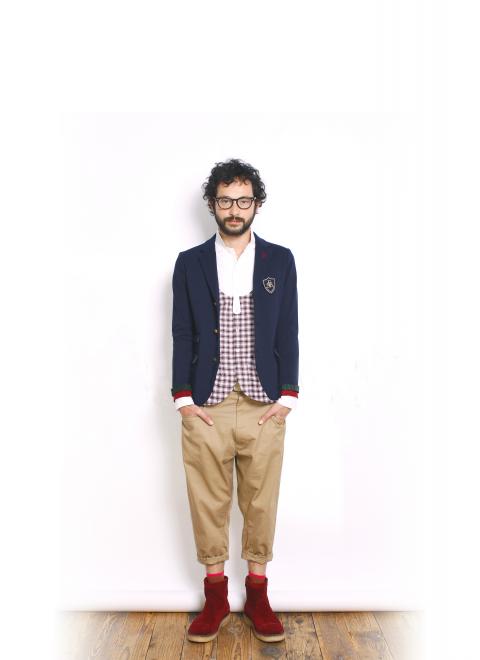
Photo:Courtesy of Even Select Shop
“I just liked dressing up. I was always very vain,” says Chen. She is fluent in Japanese and visits the country once a month to keep abreast of trends. One of her favorite Tokyo neighborhoods is Shinjuku, where Chen takes note of what young hipsters are wearing. She also reads Japanese magazines like So-en, Nylon and Fruits, which is devoted to street style. Current trends Chen likes include duffle coats, harem pants and oversized cardigans with dolman sleeves.
All of those styles are represented in Frapbois’ current line. The Japanese label is known for its fanciful shapes and unusual fabric combinations. Knitwear in Frapbois’ autumn-winter collection, called “Leprechaun Crossing,” include an oversized sweatshirt topped with a yoke knit from three yarns in different gauges. Dresses and jackets have flourishes like petal-shaped collars or appliques cut from fake fur. Scarves, cardigans and vests are pieced together from a patchwork of cabled knits in neutral hues like heather gray and oatmeal. Cozy fabrics like plaid flannel contrast with trendy silhouettes like a pair of flouncy “skorts” (a cross between shorts and a skirt) that feature a balloon hem and fleece lining.
Chen likes pairing her Frapbois dresses with platform shoes from Unbilical & Belly Button. The Japanese shoe brand’s current collection includes sleek ballet slippers with ladylike ankle straps perched on top of boat-like platforms that are 18cm to 23cm tall.
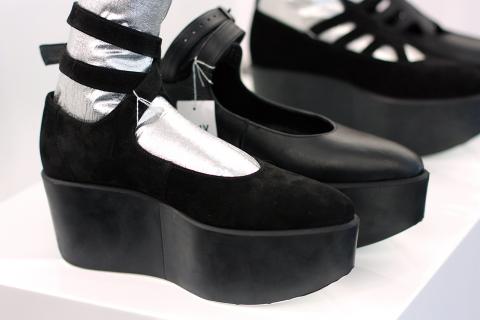
Photo: Catherine Shu, Taipei Times
Another one of Chen’s favorite designers is German-born, Belgium-based Bernhard Willhelm, whose latest collection shows off influences from Chinese and Japanese art.
“I love his use of color. It’s very exuberant and his cuts are also unique,” says Chen of Willhelm’s exaggerated silhouettes.
Willhelm’s prints are inspired by ink paintings or calligraphy, with bold splashes of color set against a contrasting background, while dresses and tops are cut to resemble kimonos. A dusk blue wool A-line coat is given a dash of flair with the Chinese characters for “now” (現在) silk-screened across the front.
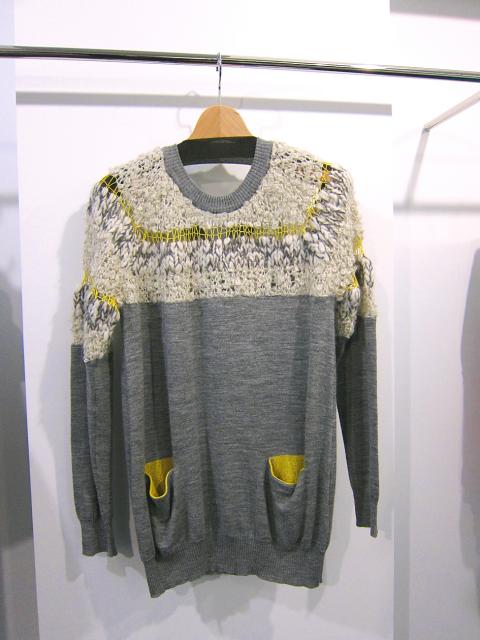
Photo: Catherine Shu, Taipei Times
A tunic with an asymmetrical, gathered hem seems to float above the wearer’s knees like a cloud, while a kelly green cardigan is covered with a lace-like network of holes and rips that make it look like a swarm of artistically minded moths converged on it.
Even Select Shop also carries several lines by emerging designers and independent labels. Despite its name, Japanese brand Bikini doesn’t sell swimwear, but accessories and clothing that show off heavy woolen cloth recycled from American and German military uniforms, like a sweeping double-breasted cape. “Their lines are simple, but they use the very best fabric and materials,” says Chen.
Blank X Marco, another Japanese line, takes a playful approach to avant-garde fashion. One oversized gray sweatshirt features an embroidered motif based on an illustration from a medieval manuscript, while another is covered with wild, freeform embroidery in crewel wools.
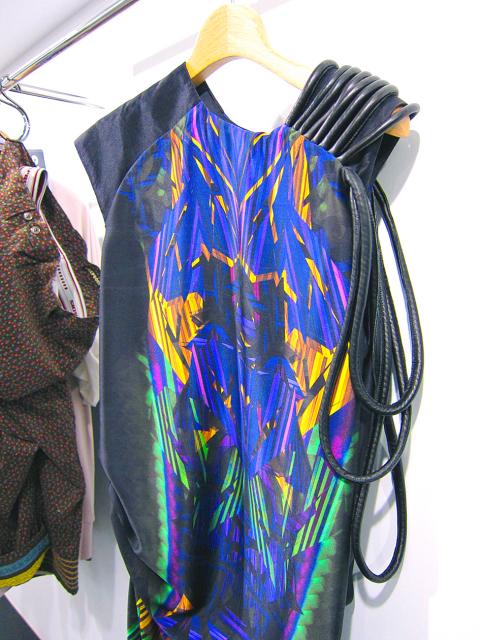
Photo: Catherine Shu, Taipei Times
In addition to Japan, Chen also makes regular buying trips to Europe. Labels she has discovered on those twice-yearly sojourns include London-based Belle Sauvage. Its designs feature crisp, kaleidoscopic digital prints in rich, jewel colors and sharp details, like shoulders sewn from quilted fake leather. German designer Esther Perbandt approaches fabric with a sculptor’s sensibility. Her pieces are mostly monochromatic, in black, white or shades of gray, but highly structured, with unusual tailoring on jackets: origami-like folds or chiffon draped gracefully like the chitons worn by figures in ancient Greek sculpture.
Items in Even Select Shop range in price from NT$2,000 to NT$30,000. Bernhard Willhelm’s line is NT$8,000 to NT$30,000, while Frapbois pieces are NT$3,000 to NT$20,000. Unbilical & Belly Button shoes sell for about NT$10,000 to NT$20,000 per pair.
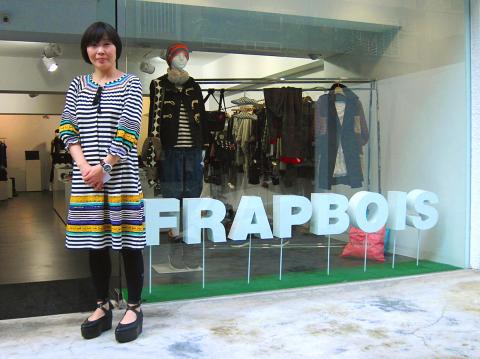
Photo: Catherine Shu, Taipei Times

Every now and then, it’s nice to just point somewhere on a map and head out with no plan. In Taiwan, where convenience reigns, food options are plentiful and people are generally friendly and helpful, this type of trip is that much easier to pull off. One day last November, a spur-of-the-moment day hike in the hills of Chiayi County turned into a surprisingly memorable experience that impressed on me once again how fortunate we all are to call this island home. The scenery I walked through that day — a mix of forest and farms reaching up into the clouds

With one week left until election day, the drama is high in the race for the Chinese Nationalist Party (KMT) chair. The race is still potentially wide open between the three frontrunners. The most accurate poll is done by Apollo Survey & Research Co (艾普羅民調公司), which was conducted a week and a half ago with two-thirds of the respondents party members, who are the only ones eligible to vote. For details on the candidates, check the Oct. 4 edition of this column, “A look at the KMT chair candidates” on page 12. The popular frontrunner was 56-year-old Cheng Li-wun (鄭麗文)

“How China Threatens to Force Taiwan Into a Total Blackout” screamed a Wall Street Journal (WSJ) headline last week, yet another of the endless clickbait examples of the energy threat via blockade that doesn’t exist. Since the headline is recycled, I will recycle the rebuttal: once industrial power demand collapses (there’s a blockade so trade is gone, remember?) “a handful of shops and factories could run for months on coal and renewables, as Ko Yun-ling (柯昀伶) and Chao Chia-wei (趙家緯) pointed out in a piece at Taiwan Insight earlier this year.” Sadly, the existence of these facts will not stop the

Oct. 13 to Oct. 19 When ordered to resign from her teaching position in June 1928 due to her husband’s anti-colonial activities, Lin Shih-hao (林氏好) refused to back down. The next day, she still showed up at Tainan Second Preschool, where she was warned that she would be fired if she didn’t comply. Lin continued to ignore the orders and was eventually let go without severance — even losing her pay for that month. Rather than despairing, she found a non-government job and even joined her husband Lu Ping-ting’s (盧丙丁) non-violent resistance and labor rights movements. When the government’s 1931 crackdown